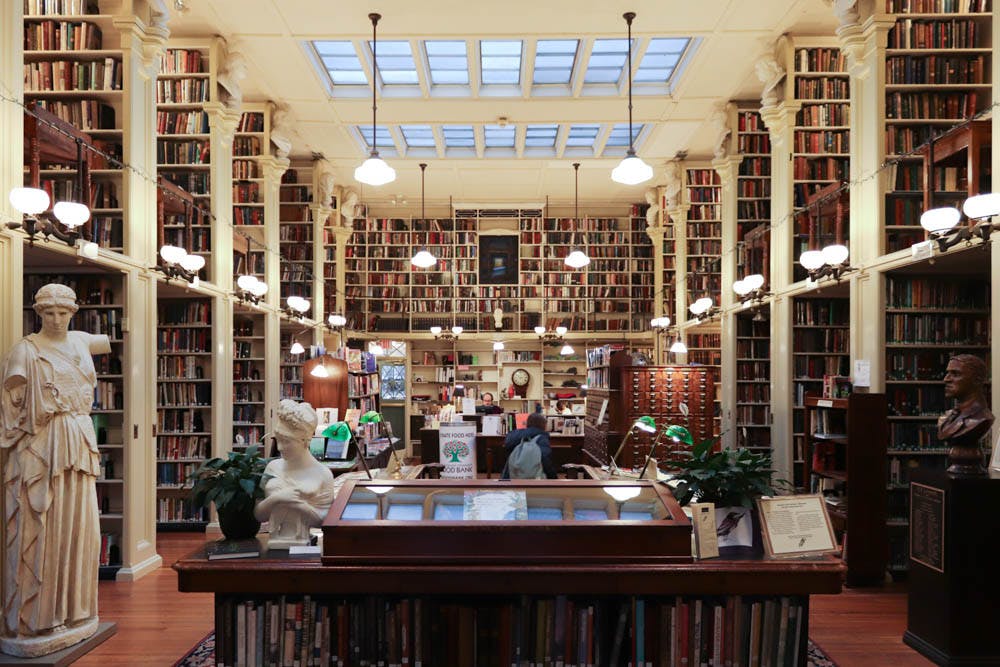The Providence Athenaeum, one of the East Side’s hidden gems, announced the reception of a large anonymous donation March 26 — marking a new era for the library’s special collections. The $100,000 gift, donated by a couple who have been loyal members of the Athenaeum for years, was directed at developing the library’s special collections, which will give the Athenaeum the opportunity to acquire and conserve rare works.
“We’re committed to the physical culture of the book,” said Matt Burriesci, the Athenaeum’s executive director.
“They saw a real need here for us to be able to acquire more things for the special permanent collection and also to have funds to restore some of the materials,” said Kate Wodehouse, director of collections and library services. The Athenaeum’s usual budget for special collections is small, with efforts targeted toward circulating materials, leaving few chances for acquisition and conservation. “I don’t know in our history that we’ve ever had anything this big directed especially toward the special collections,” Wodehouse said.
“We are very grateful to be part of this extraordinary Athenaeum community and its history,” the donors commented in a press release published by the Athenaeum.
The Athenaeum sits behind the University’s Rockefeller Library on the slope of College Hill but remains unexplored by many Providence residents and University students. The walls of the first floor and mezzanine contain some of the library’s 180,000 volumes on shelves that reach from floor to ceiling. Broken by the bookshelves into two levels of small alcoves, the library welcomes readers and studiers alike. The room that houses special collections, the Philbrick Rare Book Room, adjoins the library’s main Reading Room downstairs.
“The Athenaeum is a unique library and cultural center, and we welcome and enrich the educational and cultural pursuits of our members of the community. … We encourage a diverse public to engage in spirited conversation,” Burriesci said, noting the Athenaeum’s dedication to humanities pursuits and preserving its historic building.
The new fund allowed for the acquisition of three illustrated plates for one of the treasures of the special collection— the “Description de I’Égypte” — a 25-volume set of books commissioned by Napoleon Bonaparte in the early 19th century, Wodehouse explained. The Athenaeum spent 10 years conserving the set, which was originally acquired in 1838 — only two years after the institution was founded.
“We’re the only library in the state to have a complete set,” Wodehouse said. The set is housed in a custom-made Egyptian cabinet in the Rare Book Room.
“(In) the mid-20th century, they noticed that there had been some plates that had been taken from (the library),” Wodehouse said. “They happened to be these 14 color bird prints from the natural history portion of the set.” Wodehouse found three of the plates for sale, featuring a total of 15 birds, and decided to purchase them to enhance the Athenaeum’s current collection.
“Restoring the set to completion really adds a lot to the Athenaeum,” Burriesci said.
The plate most prominently featured at the front of the exhibit depicts a Pharaoh eagle-owl. Athena, the patron goddess of the Athenaeum, is often symbolized by an owl, “so it felt like a real homecoming to have an owl plate, ready and available,” said Robin Wetherill, the Athenaeum’s director of marketing and communications.
Currently, the plates are featured alongside “Observing Nature: Edna Lawrence and Cabinets of Curiosities,” the Athenaeum’s spring exhibition, which will be on display in the Philbrick Rare Book Room through June 17. The exhibition was put on in partnership with the Rhode Island School of Design’s Nature Lab in celebration of the Lab’s 80th anniversary, and it contains items from the Athenaeum’s collection as well as the lab’s.
“We were so thrilled to have the acquisition fit so seamlessly with the exhibit that was already planned. With this exhibit, we’re highlighting the real treasures of our natural history collection, and these plates fit beautifully into that,” Wetherill said. “It’s been one of our most viewed exhibits already.”
Wodehouse plans to extend the power of the gift by waiting to spend its entirety. “I don’t want to rush into any big decisions, acquire anything too quickly,” she said. “It gives me time to be very thoughtful about it.” She plans to consider what would align well with the current collection, future exhibits and “the narrative of the Athenaeum and the people that have connected with it over the years,” Wodehouse said.
“People think we’re a part of Brown or a part of RISD or think we’re a part of the courthouse and don’t really know that they can come in. So we’re trying to get members of the public in and excited about it,” Wetherill said. “When people walk in the door, they’re just amazed that this treasure exists and that they’d never really known about it.”
The Athenaeum will be hosting a Garden Party and Open House May 20, during which the Athenaeum’s Richmond Fountain — which has been turned off for more than a decade — will once again flow. The newly acquired plates will be on display during the open house.





